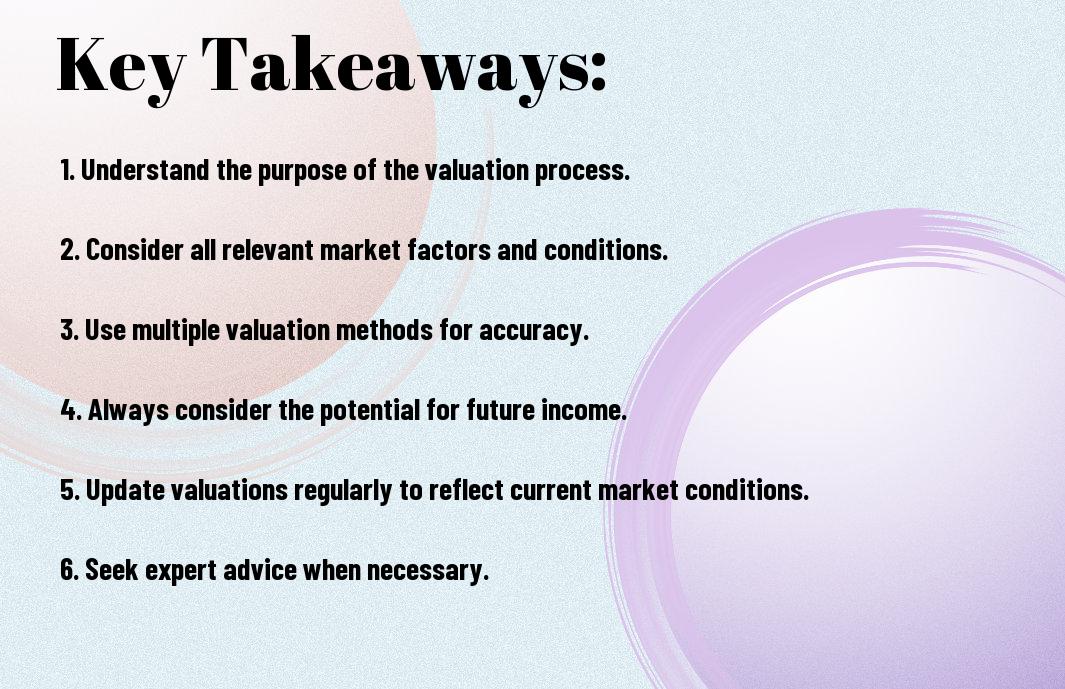7 Practical Tips for Real Estate Asset Valuation in Business Accounting
Reappraising the valuation of your real estate assets can be a daunting task, but it is crucial for maintaining accurate financial records and making informed business decisions. As a business owner, you need to ensure that you understand the ins and outs of real estate asset valuation in business accounting to accurately assess the worth of your properties. Here are 7 practical tips to help you navigate the intricacies of real estate asset valuation and make the best financial decisions for your business.
First and foremost, you must familiarize yourself with the different valuation methods commonly used in business accounting, such as comparative sales approach, income capitalization approach, and cost approach. Understanding the pros and cons of each method will allow you to choose the most appropriate approach for valuing your real estate assets. Additionally, you should engage the services of a qualified appraiser or valuation expert to ensure that your properties are accurately assessed.
Key Takeaways:
- Understand the Market: Conduct thorough research on the current market conditions and trends to accurately assess the value of your real estate assets.
- Consider Location & Amenities: Location and amenities play a significant role in the valuation of real estate assets, so be sure to carefully factor these into your calculations.
- Utilize Appropriate Valuation Methods: Choose the right valuation method for your specific real estate assets, whether it’s the income approach, cost approach, or sales comparison approach.
- Keep Track of Maintenance & Upkeep: Regular maintenance and upkeep can positively impact the valuation of your real estate assets, so be sure to document and factor in these costs.
- Stay Updated on Regulatory Changes: Stay informed about any changes in regulations or tax laws that could impact the valuation of your real estate assets in order to ensure accuracy and compliance.
Understanding Real Estate Valuation
Any successful real estate investor knows the importance of accurately valuing their assets. Understanding real estate valuation is crucial to making informed decisions and maximizing the return on your investments. Whether you’re looking to buy, sell, or simply assess the value of your real estate holdings, having a solid understanding of valuation principles is key.
Definition and Key Concepts
When it comes to real estate valuation, it’s essential to grasp the key concepts that underpin the process. Valuation refers to the process of estimating the worth of a property based on various factors such as its location, size, condition, and market demand. One of the fundamental concepts in real estate valuation is the concept of market value. Market value is the most probable price that a property should bring in a competitive and open market under all conditions requisite to a fair sale. Understanding this concept is crucial, as it forms the basis for most real estate transactions and financial decisions.
Principles of Value and Market Trends
Real estate valuation is influenced by various principles of value and market trends. These principles include the principle of supply and demand, which dictates that property value is heavily influenced by the balance between the supply of properties and the demand from potential buyers. Understanding market trends is also essential, as they can have a significant impact on property values. Keeping up with changing market trends and understanding how they affect property values is crucial for making informed investment decisions.
Overall, understanding real estate valuation is a critical aspect of managing and maximizing the value of your real estate assets. By familiarizing yourself with the key concepts and principles of valuation, you can make more informed decisions and ultimately achieve greater success in your real estate investments.

Approaches to Real Estate Valuation
Some of the most common approaches to real estate valuation include the Comparative Market Analysis (CMA), Income Capitalization Approach, and Cost Approach. Each of these methods offers a unique perspective on how to value a property, and understanding them can help you make more informed decisions about your real estate assets. For a more in-depth look at valuation methods, you can also check out this article on How to Value Real Estate Investment Property.
Comparative Market Analysis (CMA)
The Comparative Market Analysis (CMA) is a method used to estimate the value of a property by comparing it to similar properties that have recently sold in the same area. By analyzing factors such as square footage, number of bedrooms and bathrooms, and location, you can determine a fair market value for the property in question. This approach is commonly used by real estate agents to help sellers determine the listing price for their home and by buyers to assess the value of a potential purchase. Here is a breakdown of the key points of the Comparative Market Analysis:
| Advantages | Disadvantages |
| Provides a snapshot of the current market | Relies on the accuracy of the comparables |
| Based on real-world transactions | May not account for unique features of a property |
| Can be a useful starting point for valuation | Market conditions can change rapidly |
Income Capitalization Approach
The Income Capitalization Approach is a valuation method commonly used for income-producing properties such as rental apartments, office buildings, and shopping centers. This approach focuses on the potential income that a property can generate and uses this information to determine its value. By analyzing the property’s net operating income and applying a capitalization rate, you can estimate the property’s present value. Here are a few key points to keep in mind about the Income Capitalization Approach:
| Advantages | Disadvantages |
| Provides a clear picture of income potential | Relies on accurate income and expense data |
| Useful for commercial and investment properties | Market fluctuations can impact income projections |
| Considers the property’s long-term earning potential | May not account for short-term economic changes |
Cost Approach
The Cost Approach is a valuation method that focuses on the cost required to replace the property with one of similar utility. This approach considers the cost of the land, the cost to construct a similar building, and any depreciation that the property may have incurred. While this method is commonly used for new or unique properties, it can also provide a valuable perspective on a property’s value. Here are some key points to consider about the Cost Approach:
| Advantages | Disadvantages |
| Useful for new or unique properties | Relies on accurate cost estimations |
| Considers the cost of land and improvements | Does not account for market conditions or income potential |
| Can be a valuable check on the property’s value | May not reflect the property’s actual market value |
By familiarizing yourself with these different approaches to real estate valuation, you can gain a deeper understanding of how to assess the value of your real estate assets. Each method offers unique insights into a property’s worth, and by considering them all, you can make more informed decisions about your real estate investments.
Gathering and Analyzing Market Data
Now that you understand the importance of real estate asset valuation in business accounting, the next step is gathering and analyzing market data. This crucial step will provide you with the information needed to accurately determine the value of your property. One of the best practices for valuations in financial accounting is to rely on credible sources for market data. You can find a comprehensive guide on the identification of contributory assets and calculation of economic rents in BEST PRACTICES FOR VALUATIONS IN FINANCIAL ACCOUNTING here.
Primary Data Sources
When it comes to gathering market data, primary sources are your most reliable asset. These include government agencies, real estate associations, and professional appraisal services. Government agencies provide public records of property sales, which can give you a good indication of market trends in specific areas. Real estate associations and professional appraisers offer valuable insights into property values, market conditions, and comparable sales data. Utilizing primary data sources ensures that you have accurate and up-to-date information to base your valuation on.
Interpreting Market Indicators
Interpreting market indicators is a critical part of analyzing market data in real estate asset valuation. By keeping an eye on key indicators such as property supply and demand, average sale prices, and market trends, you can gain valuable insights into the current state of the market. Understanding these indicators allows you to make informed decisions about the value of your property and the potential risks and opportunities it presents. It’s essential to pay attention to both positive and negative market indicators to gain a comprehensive understanding of the market conditions.
Financial Modeling for Valuation
Your real estate asset valuation in business accounting requires a solid financial model to accurately determine the value of the property. Financial modeling involves creating projections and making assumptions about future cash flows and discount rates to arrive at a fair and accurate valuation.
Creating Cash Flow Projections
When creating cash flow projections for real estate asset valuation, you need to consider all sources of income and expenses associated with the property. This includes rental income, vacancy rates, operating expenses, and potential capital expenditures. By forecasting these cash flows over the holding period of the property, you can estimate the future potential income generated by the asset.
Applying Discount Rates and Capitalization Rates
Applying discount rates and capitalization rates is essential for determining the present value of future cash flows from the property. Discount rates reflect the time value of money and the risk associated with the investment, while capitalization rates are used to convert income into value. It’s crucial to select the right discount and capitalization rates based on the specific property and market conditions, as these rates directly impact the valuation outcome.
When conducting real estate asset valuation in business accounting, creating accurate cash flow projections and applying appropriate discount and capitalization rates are crucial for an informed and reliable valuation. By incorporating these key components into your financial model, you can ensure a comprehensive and well-informed assessment of your real estate assets.
Legal and Regulatory Considerations
Lastly, we cannot discuss real estate asset valuation without addressing the legal and regulatory considerations that can significantly impact the value of a property. From zoning laws to tax implications, staying informed about the legal landscape can help you make more accurate valuations.
Zoning Laws and Their Impact on Value
When valuing a property, it’s crucial to consider how local zoning laws may affect its potential use and, consequently, its value. For example, if a property is zoned for commercial use in an area experiencing rapid residential development, its value may significantly increase. Conversely, if a property is rezoned for industrial use in a predominantly residential neighborhood, its value may decrease. Understanding the impact of zoning laws on property values can help you make more accurate valuations and assess the potential risks and opportunities associated with a property.
Tax Implications and Reporting Requirements
Assessing the tax implications and reporting requirements associated with a property is another essential aspect of real estate asset valuation. Certain tax incentives and exemptions may increase a property’s value, while failure to comply with reporting requirements can result in fines and penalties. It’s crucial to stay abreast of changes in tax laws and understand how they can impact the value of your real estate assets. By properly accounting for tax implications, you can ensure that your valuations accurately reflect the financial health of your business.
In conclusion, understanding the legal and regulatory considerations surrounding real estate asset valuation is essential for making informed decisions and assessing the true value of your properties. By staying informed about zoning laws, tax implications, and reporting requirements, you can mitigate risks and seize opportunities in the dynamic world of real estate accounting. So, are you prepared to take on the challenge of navigating the legal and regulatory landscape to make more accurate valuations for your real estate assets?
Common Pitfalls in Valuation and How to Avoid Them
Lastly, it’s important to be aware of the common pitfalls in real estate asset valuation in order to avoid costly mistakes. Here are some of the most frequent pitfalls to watch out for, along with strategies to prevent them from impacting your valuation:
Overreliance on Specific Valuation Methods
One common pitfall in real estate asset valuation is the overreliance on specific valuation methods, such as the comparable sales approach or the income approach. While these methods can provide valuable insight into the value of a property, relying too heavily on one method can lead to an inaccurate valuation. For example, if you only use the comparable sales approach and overlook important factors such as the property’s income potential, you may undervalue the asset.
To avoid this pitfall, it’s important to consider a range of valuation methods and factors when determining the value of a real estate asset. This may include analyzing recent sales data, considering the property’s potential to generate income, and taking into account the cost approach. By using a combination of methods, you can gain a more comprehensive understanding of the property’s value and avoid the pitfall of overreliance on any single approach.
Misinterpreting Market Signals
Another pitfall to avoid in real estate asset valuation is the misinterpretation of market signals. Changes in the market, such as shifts in supply and demand or fluctuations in interest rates, can have a significant impact on the value of a property. If you fail to properly interpret these signals, you may end up overvaluing or undervaluing the asset. For example, if you overestimate the potential for appreciation in a slowing market, you may overvalue the property.
To avoid this pitfall, it’s important to stay informed about current market conditions and trends. This may involve monitoring local market data, staying updated on economic indicators, and seeking input from real estate professionals. By keeping a finger on the pulse of the market, you can avoid the pitfall of misinterpreting market signals and ensure that your valuation accurately reflects current conditions.

Case Studies and Practical Examples
Despite the complexities of real estate asset valuation, practical examples and case studies play a crucial role in understanding the process. Here are some real-life examples that demonstrate the importance of accurate valuation:
- Case Study 1: Residential property in New York City
- Property type: Condominium
- Location: Manhattan, NY
- Size: 1,500 square feet
- Valuation method: Comparative Market Analysis (CMA)
- Final Valuation: $1,200,000
- Case Study 2: Commercial property in Los Angeles
- Property type: Office Building
- Location: Downtown LA
- Size: 50,000 square feet
- Valuation method: Income Capitalization Approach
- Final Valuation: $15,000,000
- Case Study 3: Residential property in Miami
- Property type: Single-family home
- Location: Miami Beach, FL
- Size: 2,000 square feet
- Valuation method: Cost Approach
- Final Valuation: $900,000
Residential Property Valuation Scenario
When valuing residential properties, factors such as location, size, and condition are critical in determining the accurate value. Your valuation should consider comparable properties in the area, recent sales data, and any unique features that can affect the property’s worth. Additionally, understanding the local real estate market trends and economic factors is essential for an accurate valuation. By incorporating these elements, you can ensure a precise residential property valuation that reflects the current market conditions.
Commercial Property Valuation Scenario
Valuing commercial properties requires a different approach due to income-generating potentials. When assessing commercial real estate, you must consider factors such as rental income, occupancy rates, and operating expenses. Understanding the future cash flow and potential growth of the property is vital for the valuation process. Furthermore, analyzing market demand, location, and zoning regulations can significantly impact the commercial property’s value. By conducting a thorough analysis of these key elements, you can ensure an accurate commercial property valuation that reflects the asset’s income potential and market value.

Conclusion: 7 Practical Tips for Real Estate Asset Valuation in Business Accounting
Hence, it is crucial for you to apply these practical tips for real estate asset valuation in your business accounting practices. By understanding the methods and considerations for asset valuation, you can ensure that your financial statements accurately reflect the value of your real estate investments. Additionally, implementing these tips can help you make informed strategic decisions and effectively manage your real estate assets in order to maximize their value and profitability.
Overall, mastering the art of real estate asset valuation is essential for business accounting success. By following these tips and continuously staying updated on industry best practices, you can confidently navigate the complex landscape of real estate valuation and ensure the financial health and viability of your investments.
FAQ
Q: What is real estate asset valuation?
A: Real estate asset valuation is the process of determining the value of a property for financial reporting, tax assessment, investment analysis, and more. It involves assessing various factors such as the property’s location, condition, size, and market trends to arrive at an accurate estimate of its worth.
Q: Why is real estate asset valuation important in business accounting?
A: Real estate asset valuation is crucial in business accounting as it helps businesses and investors make informed financial decisions. Accurate valuation ensures that a property’s value is reflected correctly on a company’s balance sheet and helps in determining the return on investment for real estate assets.
Q: What are some practical tips for real estate asset valuation?
A: Some practical tips for real estate asset valuation include conducting thorough market research, understanding the property’s potential for income generation, considering the cost of maintenance and repairs, factoring in any regulatory or zoning issues, and obtaining professional appraisals from qualified real estate professionals. Additionally, staying updated on local market trends and seeking advice from industry experts can also aid in accurate valuation.


